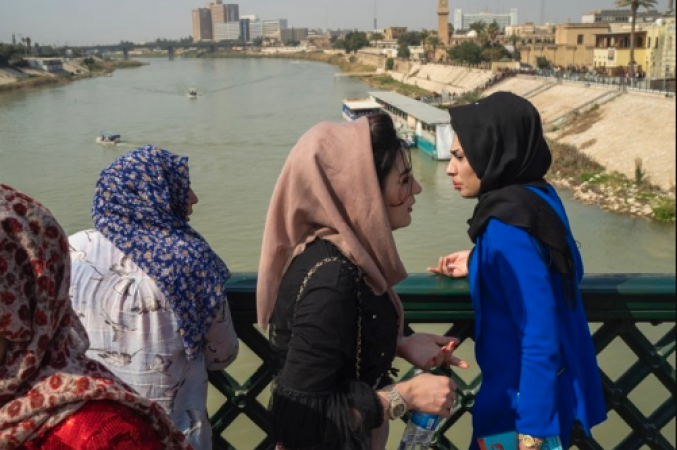
Baghdad: A recent evening saw young Iraqi men and women dancing wildly to a local rapper on the banks of the Tigris River while a vermilion sun set behind them. He was wearing jeans and trainers. The terror that spread after the American invasion 20 years ago is a far cry from today.
Today, Iraq's capital is full of life and a sense of renewal, and its citizens are enjoying a rare moment of peace in a turbulent period of recent history. Dusty paperback books stacked to the ceiling in the wooden stalls of the city's outdoor book market, packed with customers of all ages and socioeconomic levels.
Wealthy youths cruise their muscle cars past al-Qaeda's former stronghold, while a recreational cycling club organizes weekly trips to former battlegrounds. Where the bombs once fell, a few glistening structures gleam.
Also Read: Survey: 50% of women scientists worldwide experience sexual harassment
President George W. Bush described the US-led invasion on March 20, 2003 as a mission to liberate the Iraqi people and eliminate all weapons of mass destruction. Saddam Hussein's regime was overthrown in just 26 days.
The CIA's chief weapons inspector reported two years later that no stockpile of nuclear, chemical, or biological weapons had ever been discovered.
A dictator who imprisoned 20 million people, tortured and executed dissidents for a quarter of a century fell by war. However, it also broke up a previously existing single state at the center of the Arab world, creating a power vacuum and leaving oil-rich Iraq as a wounded nation in the Middle East, a power between Iran, the Arab Gulf was ripe for conflict. states, the United States, terrorist organizations and Iraq's own rival sects and parties.
Undoubtedly, the violence that followed made a lasting impression on Iraqis; Between 2003 and 2019, more than 8,000 US service members, civilian contractors and civilians were also killed, according to the Watson Institute for International and Public Affairs at Brown University.
Also Read: A Myanmar team will examine 400 Rohingya returning from Bangladesh
The time was marked by years of unemployment, disorder, sectarian violence and terrorism, along with unreliable electricity and other public services.
Today Iraq is home to 40 million people, but only half of them are old enough to remember life under Saddam or during the US invasion. Young Iraqis expressed regret for the loss of stability that followed Saddam's coup in dozens of interviews from Baghdad to Fallujah, but they also said that the war was over and that many were emerging with freedom and opportunities to follow their dreams. was optimistic about.
President Abdul Latif Rashid, who took office in October, spoke eloquently about the prospects for the nation as he sat in an upholstered Damascus chair in the palace where Saddam once resided, surrounded by paintings by contemporary Iraqi artists . Iraq is viewed by the rest of the world as a nation that has been ravaged by war.
He claimed Iraq is prosperous, peace has returned, and opportunities lie ahead for young people in the country's growing population. "I am convinced that life in Iraq will improve greatly if they have a little patience."
Most Iraqis do not have the same optimism. The conversation begins with outrage that Saddam's ouster left the nation vulnerable to sectarian militias, politicians, and criminals out for personal gain or for other nations. However, when talking to young Iraqis, one gets the feeling of a generation that is ready to move on.
Safa Rashid, a 26-year-old writer with a ponytail, discusses politics with friends at a welcoming coffee shop in the capital's Karada neighborhood. The cafe and its patrons can be easily found in Brooklyn or London, thanks to its well-stocked library nook, images of Iraqi writers, and travel posters.
Rasheed was just a young boy when the Americans arrived, and he regrets the loss of "a state, a country that had laws and establishment" that came about as a result of the invasion.
He claimed that the Iraqi state was weak and exposed to domestic and foreign power struggles. He and like-minded friends can now freely discuss solutions while sitting in a coffee shop. "I am sure that the youth will try to rectify this situation."
A different cafe on a different day. Noor Alhuda Saad, a political activist and 26-year-old Ph.D. Mustansiriya University candidate claims his generation is leading protests against corruption, demanding services, demanding more inclusive elections and won't stop until they see a better Iraq Can't make it
She tapped her pale green fingernails on the table as she claimed that the old guard Sunni and Shiite parties, as well as the militias and gangs to which they were associated, "didn't understand sharing democracy" after 2003.
She continued, accusing the government of failing to restore public services and create a fully democratic state in the wake of occupation.
Young people like me are born into this environment and trying to change the situation," she said. "The ruling class does not believe that these are pressing problems that need to be resolved. And for that reason, we are engaged.
Also Read: Rare phone call between the foreign ministers of China and Ukraine
Insurgency and invasion remnants have been largely eliminated from Baghdad. The airport road, which had been damaged by IED and machine gun attacks, Ferdous Square, the Green Zone, and the former Palestine Hotel have all been landscaped or painted over recently.
The invasion only exists in memory, with vivid orange flashes and concussions of American "shock-and-awe" bombs raining down in a thunderous cacophony, tanks rolling along the embankment, Iraqi forces fighting across the Tigris or wading into water to avoid US troops, civilian deaths, and the desperate, unsuccessful attempt to save a fellow journalist who had been seriously injured by a US tank strike in the final days of the battle for Baghdad. Smoke pillars rose over the city as US Marines pulled back as Iraqi civilians started robbing ministries